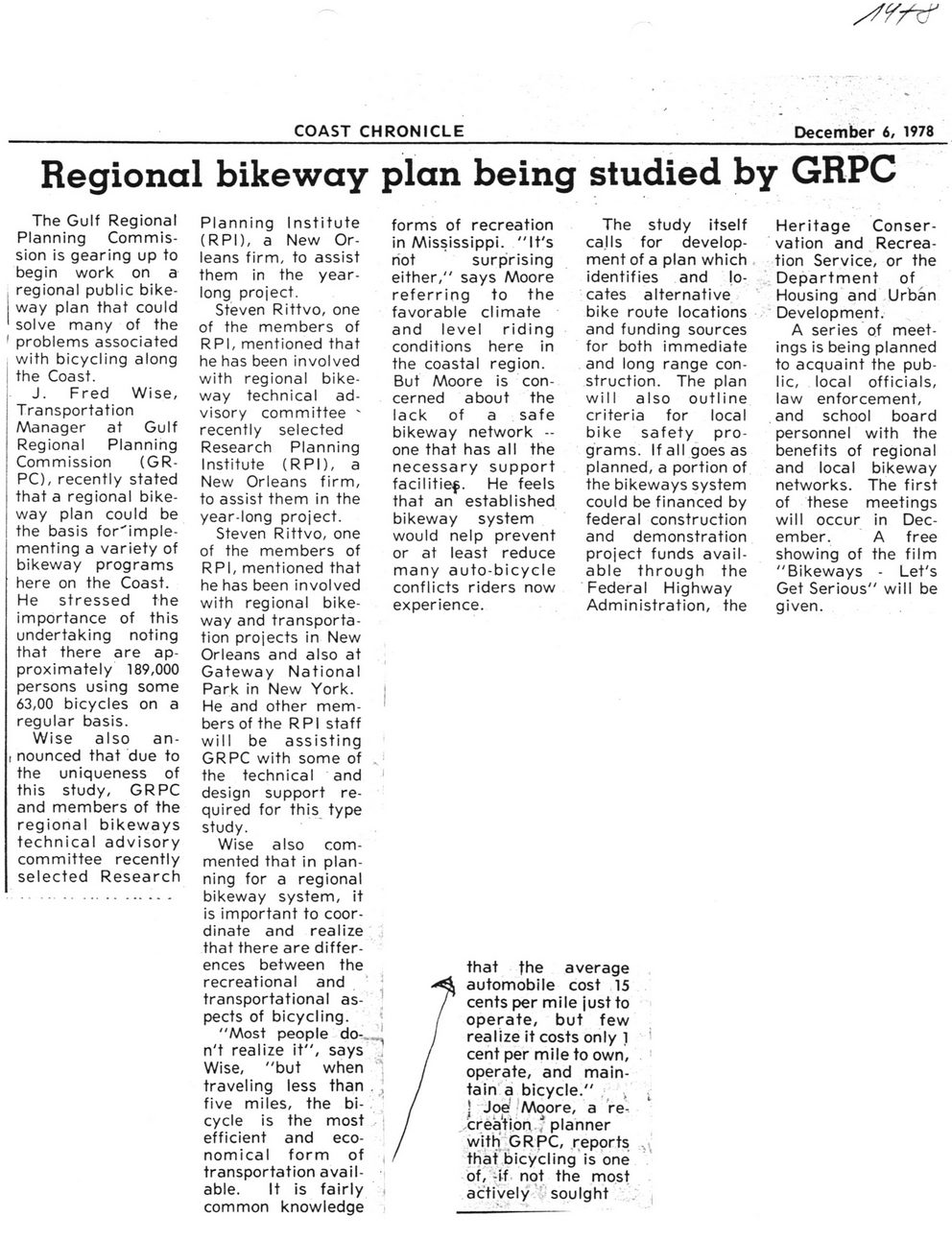This text was obtained via automated optical character recognition.
It has not been edited and may therefore contain several errors.
COAST CHRONICLE December 6, 1978 Regional bikeway plan being studied by GRPC The Gulf Regional Planning Commission is gearing up to begin work on a regional public bike-j way plan that could ' solve many of the ' problems associated with bicycling along : the Coast. I J. Fred Wise, j Transportation i Manager at Gulf I Regional Planning j Commission (GR- i PC), recently stated that a regional bikeway plan could be the basis for-implementing a variety of bikeway programs here on the Coast. He stressed the importance of this undertaking noting that there are approximately 189,000 persons using some 63,00 bicycles on a regular basis. Wise also announced that due to the uniqueness of this study, GRPC and members of the regional bikeways technical advisory committee recently selected Research Planning Institute (RPI), a New Orleans firm, to assist them in the yearlong project. Steven Rittvo, one of the members of RPI, mentioned that he has been involved with regional bikeway technical advisory committee ' recently selected Research Planning Institute (RPI), a New Orleans firm, to assist them in the year-long project. Steven Rittvo, one of the members of RPI, mentioned that he has been involved with regional bikeway and transportation projects in New Orleans and also at Gateway National Park in New York. He and other members of the RPI staff will be assisting GRPC with some of the technical and design support required for this type study. Wise also commented that in planning for a regional bikeway system, it is important to coordinate and realize that there are differences between the recreational and transportational aspects of bicycling. "Most people do-., n't realize it", says Wise, "but when traveling less than . five miles, the bicycle is the most efficient and economical form of transportation available. It is fairly common knowledge forms of recreation in Mississippi. "It's not surprising either," says Moore referring to the favorable climate and level riding conditions here in the coastal region. But Moore is concerned about the lack of a safe bikeway network -one that has all the necessary support facilitief. He feels that an established bikeway system would nelp prevent or at least reduce many auto-bicycle conflicts riders now experience. The study itself calls for development of a plan which identifies and locates alternative bike route locations and funding sources for both immediate and long range construction. The plan will also outline criteria for local bike safety programs. If all goes as planned, a portion of the bikeways system could be financed by federal construction and demonstration project funds available through the Federal Highway Administration, the that the average automobile cost 15 cents per mile just to operate, but few realize it costs only 1 cent per mile to own, operate, and maintain a bicycle." > ? Joe 'Moore, a recreation.^ planner with GRPC, reports, that bicycling is one of, 4f not the most actively ?? soulght Heritage Conservation and Recreation Service, or the Department of Housing and Urban Development. A series of meetings is being planned to acquaint the public, local officials, law enforcement, and school board personnel with the benefits of regional and local bikeway networks. The first of these meetings will occur in December. A free showing of the film "Bikeways - Let's Get Serious" will be given.

Bartram Coast-Chronicle-12-6-78